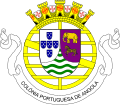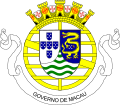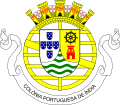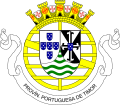
The Community of Portuguese Language Countries, also known as the Lusophone Community, is an international organization and political association of Lusophone nations across five continents, where Portuguese is an official language. The CPLP operates as a privileged, multilateral forum for the mutual cooperation of the governments, economies, non-governmental organizations, and peoples of the Lusofonia. The CPLP consists of 9 member states and 33 associate observers, located in Europe, South America, Asia, Africa and Oceania, totaling 38 countries and 4 organizations.

The national emblem of Cape Verde contains a circle within which is written the name of the nation in Portuguese. Within the circle are a torch and triangle, symbols of freedom and national unity. At the top of the shield is a plumbob, a symbol of righteousness; three chain links are at the bottom. This emblem replaces the earlier variant with the seashell that had been in use since independence. The current emblem was adopted in 1999.

The national emblem of Angola is the national emblem of Angola that reflects the recent past of the new nation. There is heavy Marxist imagery found on the device, expanded from what is found on the national flag.
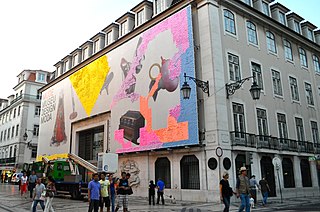
Banco Nacional Ultramarino is a Macau banking and financial services corporation. It was historically a Portuguese bank with operations throughout the world, especially in Portugal's former overseas provinces. It ceased existence as an independent legal entity in Portugal following its merger in 2001 with Caixa Geral de Depósitos, the government-owned savings bank.
The following is a list of Portugal-related articles. Those interested in the subject can monitor changes to the pages by clicking on Related changes in the sidebar.

Portuguese is spoken in a number of African countries and is the official language in six African countries: Angola, Mozambique, Guinea-Bissau, Cape Verde, São Tomé and Príncipe and Equatorial Guinea. There are Portuguese-speaking communities in most countries of Southern Africa, a mixture of Portuguese settlers and Angolans and Mozambicans who left their countries during the civil wars. A rough estimate has it that there are about 14 million people who use Portuguese as their sole mother tongue across Africa, but depending on the criteria applied, the number might be considerably higher, since many Africans speak Portuguese as a second language, in countries like Angola and Mozambique, where Portuguese is an official language, but also in countries like South Africa and Senegal, thanks to migrants coming from Portuguese-speaking countries. Some statistics claim that there are over 60 million Portuguese speakers in the continent.

The national emblem of East Timor is one of the national symbols of East Timor.

The Lusofonia Games is a multinational multi-sport event organized by the ACOLOP, which involves athletes coming from Lusophone (Portuguese-speaking) countries. Most countries competing are countries that are members of the CPLP, but some are countries with significant Portuguese communities or have a history with Portugal.

The 2009 Lusofonia Games was the 2nd Lusofonia Games, a multi-sport event for delegations representing Portuguese-speaking National Olympic committees. It took place in Lisbon, Portugal, from 11 to 19 July 2009. The Pavilhão Atlântico acted as the main venue, staging the opening ceremonies and the majority of the sporting events.

ACOLOP is an Olympic-related non-profit organization officially established on 8 June 2004, in Lisbon and has been approved by International Olympic Committee. It was founded by the national Olympic committees (NOCs) of Angola, Brazil, Cape Verde, East Timor, Guinea-Bissau, Macau, Mozambique, Portugal and São Tomé and Príncipe; it also includes Equatorial Guinea as an associate member. In April 2006, India and Sri Lanka were admitted also as associate members, based on their common historical past with Portugal.

The Comunidade do Escutismo Lusófono is the international community of Scouting organizations in the Lusophone countries. Its members are:

The coat of arms of São Tomé and Príncipe consists of a peregrine falcon on the left and a grey parrot on the right holding a coat of arms with a palm in its center. The coat of arms is surmounted by a blue star. Above, there is a band that states the name of the country. At the base of the arms the national motto, "Unity, discipline, work" is inscribed.
The Athletics competition at the 2009 Lusophone Games was held in the Estádio Universitário de Lisboa on 12,13 and 19 July 2009.
Overseas province was a designation used by Portugal for its overseas possessions, located outside Europe.
The Athletics competition at the 2014 Lusophone Games took place at the GMC Athletic Stadium between 23 and 27 January 2014 in Bambolim, Goa State, India.
Samira Nandi Marques Vera-Cruz is a Cape Verdean film director, producer, editor and actress.









